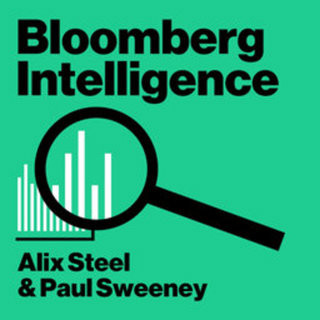
Instant Reaction: Jay Powell Speaks
Bloomberg's Nathan Hager and Michael McKee discuss the latest PCE data and reaction from Fed Chair Jerome Powell. Plus, reaction from Wells Fargo Senior Economist Sarah House.See omnystudio.com/listen...
29 Mar 202415min

Instant Reaction: Inflation Data
Bloomberg's Nathan Hager breaks down the latest PCE data with Bloomberg Economics and Policy Editor Michael McKee. Plus, reaction to the data from Tom Porcelli, Chief US Economist at PGIM Fixed Income...
29 Mar 202429min

Robinhood Credit Card, Boeing Shuffle
Watch Alix and Paul LIVE every day on YouTube: http://bit.ly/3vTiACF.On this week’s podcast, RobinHood Co-Founder and CEO Vlad Tenev, discusses Robinhood’s new credit card. Mark Niquette, Bloomberg Re...
28 Mar 202438min

Home Depot to Buy SRS , Amazon-Anthropic Tie-Up
Watch Alix and Paul LIVE every day on YouTube: http://bit.ly/3vTiACF. Drew Reading, Bloomberg Intelligence U.S Homebuilding Analyst, discusses Home Depot saying they will buy the roof supply firm, SR...
28 Mar 202442min

INSTANT REACTION: Bankman-Fried Sentenced to 25 Years
FTX co-founder Sam Bankman-Fried was sentenced to 25 years in prison for stealing billions of dollars from customers, marking the final chapter in a case that has both captivated and overshadowed the ...
28 Mar 202419min

Robinhood Unveils Credit Card, Carnival Earnings
Watch Alix and Paul LIVE every day on YouTube: http://bit.ly/3vTiACF. Robinhood Markets CEO and Co-Founder Vlad Tenev, discusses the company’s new credit card. Matthew Palazola, Bloomberg Intelligence...
27 Mar 202444min

iPhone Shipments Fall in China , Baltimore Bridge Collapse
Watch Alix and Paul LIVE every day on YouTube: http://bit.ly/3vTiACF. Mandeep Singh, Bloomberg Intelligence Senior Tech Industry Analyst, joins the program to discuss iPhone shipments falling in China...
26 Mar 202434min

Listen Now: The Big Take
The Big Take from Bloomberg News brings you inside what’s shaping the world's economies with the smartest and most informed business reporters around the world. The context you need on the stories tha...
26 Mar 20241min





















